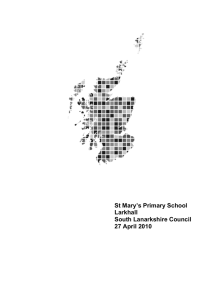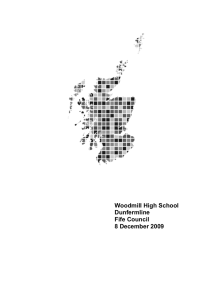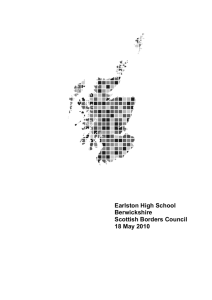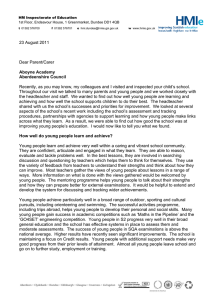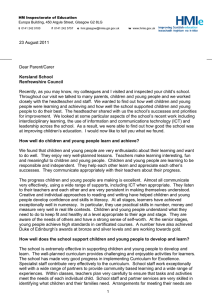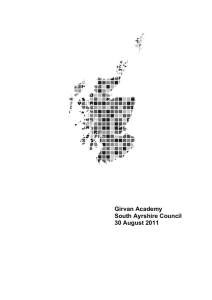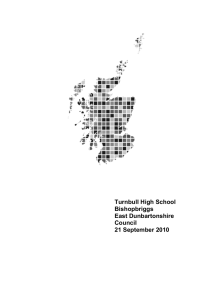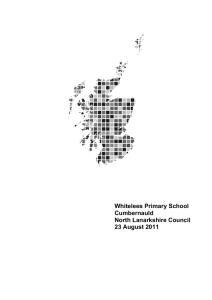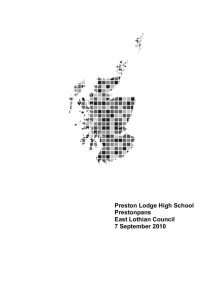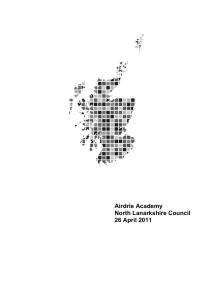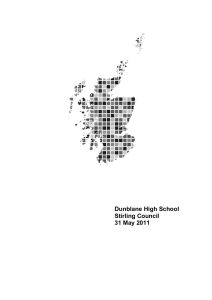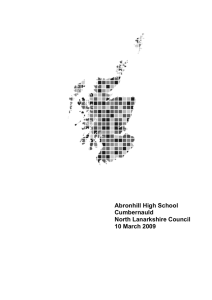Canberra Primary School East Kilbride South Lanarkshire Council
advertisement
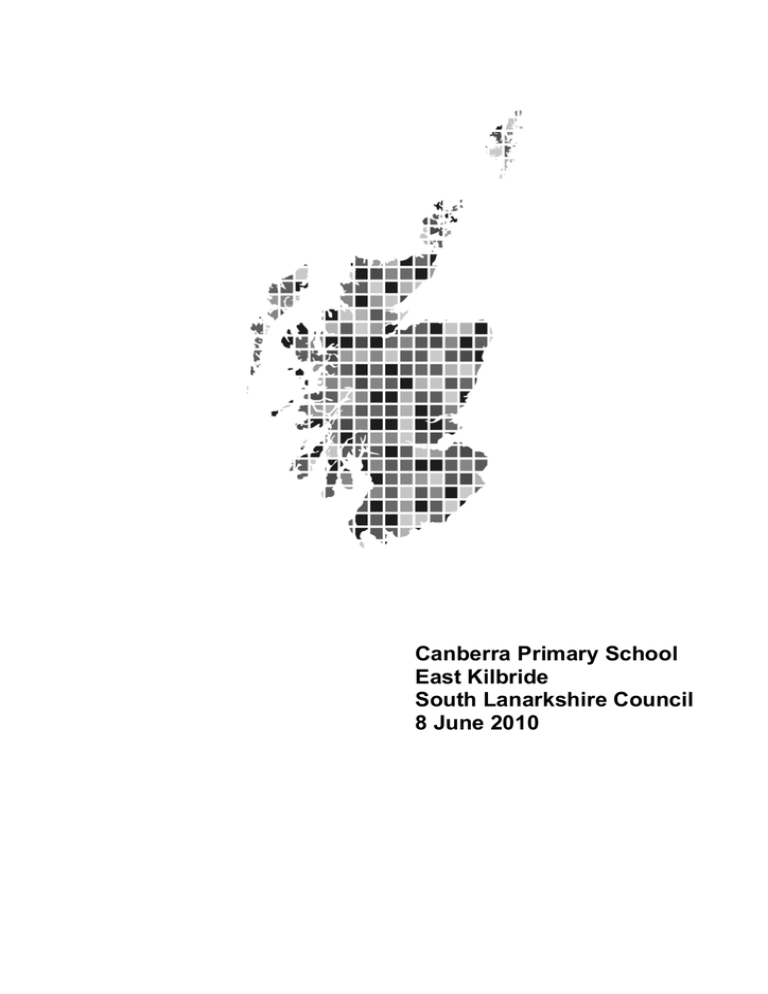
Canberra Primary School East Kilbride South Lanarkshire Council 8 June 2010 We published a report on Canberra Primary School in May 2009. That report set out key strengths of the school and main points for action. This follow-through report is based on an inspection visit which was carried out in March 2010. It tells you about improvements since the original inspection in the quality of education which the school provides. It also comments on how the school is getting on with the main points for action. First we focus on changes in the core work of the school. We explain how the school has got better at helping children to learn and benefit from being at the school. Next we look at the key processes which enable this to happen, including the involvement of parents1. Our report also describes developments in the ‘ethos’ of the school, by which we mean how well children are cared for and how much is expected of them in all aspects of school life. Finally we comment on improvements in leadership to help the school achieve its aims. A copy of this report has been placed on the HMIE website www.hmie.gov.uk. Where applicable, you will also find analyses of questionnaire returns. 1 Throughout this report, the term ‘parents’ should be taken to include foster carers, residential care staff and carers who are relatives or friends. Contents 1. The school 2. Particular strengths of the school 3. How well do children learn and achieve? 4. How well do staff work with others to support children’s learning? 5. Are staff and children actively involved in improving their school community? 6. Does the school have high expectations of all children? 7. Does the school have a clear sense of direction? 8. What happens next? 1. The school Canberra Primary School serves the areas of Hairmyres, Newlandsmuir and Westwood in East Kilbride. Since the original inspection, the school has had three acting headteachers. The headteacher was appointed to the school on a permanent basis in October 2009. 1 2. Particular strengths of the school • Motivated children who are enthusiastic learners and are proud of their achievements. • Partnerships with parents, support agencies and the wider community to meet learning needs and broaden children’s experiences. • Commitment of the education authority, the headteacher and all staff to improving the work of the school. • The leadership of the headteacher. 3. How well do children learn and achieve? Children are proud of their school and their achievements. They work very well together in teams and achieve success in local events, for example, football and athletics competitions. Teachers engage with children effectively in well-planned, challenging and varied experiences. Children now have more responsibility for their learning. They are more confident and enterprising. They know their strengths and what they can do to improve. Staff are taking increasing account of Curriculum for Excellence. Children’s learning is improving in areas, such as, science and information and communications technology. Children’s progress in English language and mathematics is improving. Children use literacy and numeracy skills well across different areas of their learning and apply effective strategies to solve problems. Staff have improved significantly the way they meet the needs of learners, including vulnerable children. The new systems in place are very well organised, rigorous and effective. Support and teaching staff work well together to provide valuable support for children and assist them with their learning and development. 2 4. How well do staff work with others to support children’s learning? Children at all stages benefit from stronger partnerships with parents, other agencies and the community. The school is successfully encouraging parents to become more involved in their children’s learning. Staff have made helpful leaflets containing activities which parents could carry out at home to support their children’s learning. Parents and other members of the community help children learn about the world of work. Parents’ evenings, interesting newsletters and progress reports keep parents well informed about their children’s learning. 5. Are staff and children actively involved in improving their school community? Children are now more involved in decision making. They make choices about aspects of their learning and have good ideas about how to improve further the life and work of the school. They are positive about the improvements which have been made. Staff work together well and are involved in planning and evaluating improvements. Teachers share effective practice with each other and with staff from other schools. The management team have introduced very good arrangements to monitor and evaluate the quality of education. These include class visits, sampling children’s work and tracking the progress of children. 6. Does the school have high expectations of all children? Children, parents and staff show great pride in their school. They have a sense of community, where everyone is valued. Children are polite, well mannered and very well behaved. Overall, staff have suitably high expectations of children’s attainment and achievements. They assist children to do well and take appropriate account of children’s 3 prior learning. As a result, children’s progress in English language and mathematics is improving. Staff involve children successfully in setting targets for their learning and in assessing their own and other children’s work. Children now have higher expectations of their own attainment and achievements. 7. Does the school have a clear sense of direction? The school is making very effective progress. In a very short space of time, the headteacher has established sound working relationships across and beyond the school. She has gained the respect of staff, children and parents. The quality of leadership for learning shown by the headteacher is outstanding. She is knowledgeable, very well organised and has a clear focus on securing improvements for learners. She works very well with the depute headteacher and principal teacher to support school improvement. Together, they have a very good understanding of the school’s strengths and areas for improvement. Working together, staff take on additional roles which deliver better learning experiences for children. School staff are successfully taking forward school improvement priorities which provide a higher quality of education and care for children. Canberra Primary School now performs much better and shows a strong capacity to continue to improve. 8. What happens next? Since the original inspection, there is clear evidence of improvement. Leadership, self-evaluation and the arrangements for meeting learning needs are now at a satisfactory or better level. With continued effective leadership the school is well placed to improve further. We will make no further visits in connection with the May 2009 inspection report. Our District Inspector will continue to engage with the education authority in monitoring progress. HM Inspector: Lesley A Allan 8 June 2010 4 When we write reports, we use the following word scale so that our readers can see clearly what our judgments mean. excellent very good good means means means satisfactory weak unsatisfactory means means means outstanding, sector leading major strengths important strengths with some areas for improvement strengths just outweigh weaknesses important weaknesses major weaknesses If you would like to find out more about our inspections or get an electronic copy of this report, please go to www.hmie.gov.uk. Please contact us if you want to know how to get the report in a different format, for example, in a translation, or if you wish to comment about any aspect of our inspections. You can contact us at HMIEenquiries@hmie.gsi.gov.uk or write to us at BMCT, HM Inspectorate of Education, Denholm House, Almondvale Business Park, Almondvale Way, Livingston EH54 6GA. Text phone users can contact us on 01506 600 236. This is a service for deaf users. Please do not use this number for voice calls as the line will not connect you to a member of staff. You can find our complaints procedure on our website www.hmie.gov.uk or alternatively you can contact our Complaints Manager, at the address above or by telephoning 01506 600259. Crown Copyright 2010 HM Inspectorate of Education
